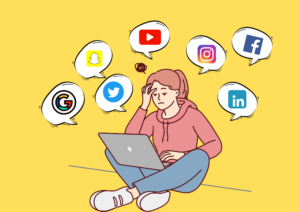My thoughts on W.J. Potter’s Media Literacy are as follows: Media messages are increasingly overpowering us, starting with Hollywood’s release of feature films. “YouTube is one of the platforms used to watch videos and listen to music” (YouTube, 2013). Additionally, we can quickly search for references like books on Google, which returns many uploaded web pages if needed.
Before, a person was required to enroll in a course at any institution or pass an audition to become a qualified artist, musician, photographer, journalist, writer, or video game creator. But in the modern world, anything is now feasible. They may submit content through the applications and posts and be known for their positions, especially if they do so frequently.
From the statement of Roberts & Foehr, “In your lifetime, much of the increase in media exposure has been from video games and computer usage, which were typically engaged at the same time as other media use, especially listening to music or watching television (D.F. Roberts & Foehr, 2008). We are all aware that there are media messages, but our minds are automatically set to filter the messages, and some of us do not know if they have a benefit. Because of our many messages, we are paying attention to them. Like the statement, “A wealth of information creates a poverty of attention “(Angwin, 2009, p. 239). Our minds are overwhelmed by too many messa

ges, but we should also know how to pay attention to them because we will benefit from them in the future.
When it comes to Media literacy, this is the thing from the statement that says “that we expose ourselves to the mass media to interpret the meaning of the messages” from the perspective of anyone. They express it using emotional, aesthetic, and moral dimensions in how they react to the messages they have read in any references. Media literacy comprises three building blocks: skills, knowledge, structures, and a personal locus. These help us develop authentic media literacy. Same thing how we do it when we post in Instagram, Facebook, etc. we post our reactions about the current issues that we are encountering, but of course before we construct, we make sure that everything in our content are true.

Hi Keren,
The quotation – “A wealth of information creates a poverty of attention” – really hits home for me. I find myself multitasking way too much – I can’t remember the last time I watched a movie at home without also being on my phone. Of course, the concept of multitasking has totally been discredited. We’re not actually able to do it, even though we all think we’re experts at it.
You mention the importance of verifying before posting. Have you found any great strategies or programs to use with students? I use CIVIX and Mediasmarts, but I am always looking for more recommendations.
Thanks!
hi Kim,
Actually, I am also guilty of that statement because, really, I can’t avoid multitasking—doing my reports while browsing Facebook. And when it comes to strategies or programs for students, honestly, I am not familiar with those kinds of social media, especially the one that you mentioned. Because in our school in the Philippines, we are not that advanced when it comes to programs for students.
Hi Keren
I find your blog post to be most intriguing. I too am drawn to the quote “A wealth of information creates a poverty of attention“ (Angwin, 2009, p. 239). I find that I am sometimes guilty of ‘consuming’ a great deal of information around me and from various different sources, however, I sometimes do not pay enough attention to the source of the information and the credibility of that information.
The truth is, we have multiple sources from which we can get information. We no longer have to depend on print or electronic media – specifically TV or Radio. In the same way that in the past one had to enroll in a school to learn to produce music, go to a studio to record a song, or study to become a photographer the fact is this is no longer the case. The advent of the internet has provided an avenue to do it yourself or learn from the confines of our own space. Similarly, we now have media influencers who can provide real-time updates as an event unfolds.
What remains important, however, is that we must always consider the source of our information.